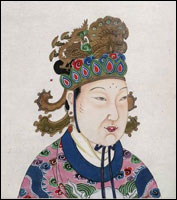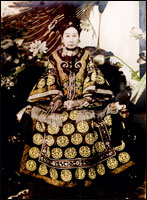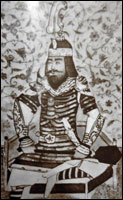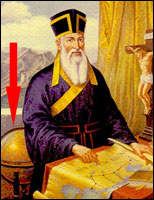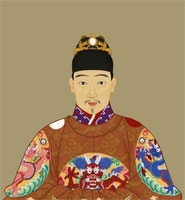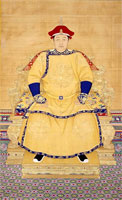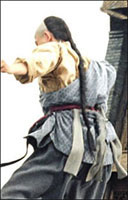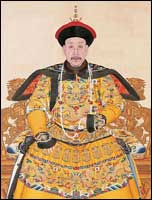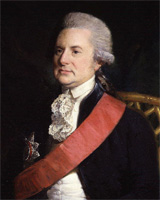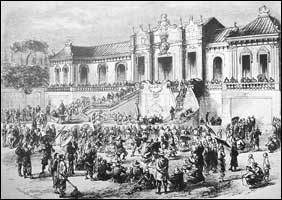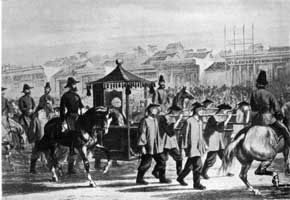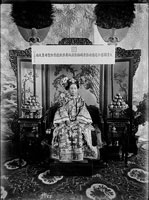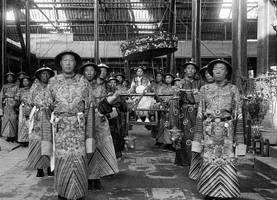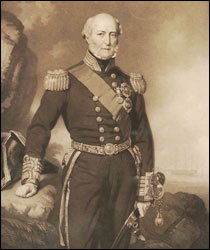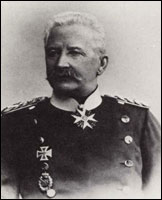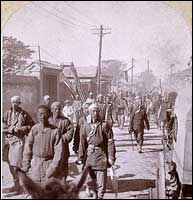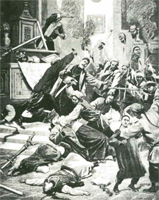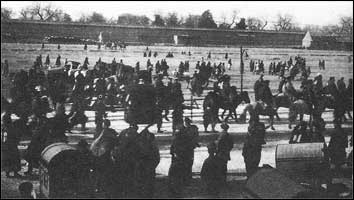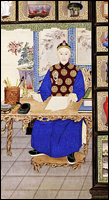| SOON AFTER THE RESURRECTION OF CHRIST, CHRISTIANITY ENTERED CHINA, AND THE HISTORY OF THAT GREAT NATION IS A DREADFUL SUCCESSION OF SAINT BARTHOLOMEW'S DAY MASSACRES!! |
THE CHINESE SAINT BARTHOLOMEW'S DAY MASSACRE!!
Before the dreadful Saint Bartholomew's Day Massacre in France, that country was on the verge of becoming a great Christian nation. Likewise, before June 1900, China was on the verge of becoming a great Christian Republic....All patriotic Chinese were tired of she-wolf Tzu Hsi and the Manchu dynasty.
600 years before the Resurrection of Christ, the Great Prophet Isaiah–who predicted the rebirth of Israel in the wilderness–also predicted that China would be among the blessed nations that received the Good News of the Gospel:
Behold, these shall come from far: and, lo, these from the north and from the west; and these from the land of Sinim (Heb. erets Sē·nēm) (Isaiah 49:12).
Sinim is the origin of the word Sino, which is a familiar designation for China. The great prophecy of Isaiah was fulfilled on the Day of Pentecost when real Jews from every nation under heaven were gathered in Jerusalem for the outpouring of the Holy Spirit:
And when the day of Pentecost was fully come, they were all with one accord in one place. And suddenly there came a sound from heaven as of a rushing mighty wind, and it filled all the house where they were sitting. And there appeared unto them divided tongues like as of fire, and it sat upon each of them. And they were all filled with the Holy Spirit, and began to speak with other languages, as the Spirit gave them utterance. And there were dwelling at Jerusalem Jews, devout men, out of every nation under heaven. Now when this was noised abroad, the multitude came together, and were confounded, because that every man heard them speak in his own language. And they were all amazed and marvelled, saying one to another, "behold, are not all these which speak Galileans? And how hear we every man in our own language, wherein we were born? Parthians, and Medes, and Elamites, and the dwellers in Mesopotamia, and in Judaea, and Cappadocia, in Pontus, and Asia, Phrygia, Pamphylia, in Egypt, and in the parts of Libya about Cyrene, and strangers of Rome, Jews and proselytes, Cretes and Arabians, we do hear them speak in our languages the wonderful works of Elohim" (Acts 2: 1-11).
Before he was assumed into heaven at Roma, the Great Apostle Paul said that the sound of Pentecost was heard at the ends of the earth:
But I (Paul) say, "have they not heard? Yes verily, their sound went into all the earth, and their words unto the ends of the earth" (Romans 10:18).
That definitely included Sinim—one of the greatest nations of antiquity—and the New World nations across the Atlantic Ocean.
China always had strict laws against INCEST and that prohibition came from the Bible . . . and not from Confucius. Marriage to people with the same name was forbidden because they might be related. European dynasties, and the fake "Jews," are all imbeciles because of incest!
Whenever the Gospel of Christ is ready to triumph over Satan, he always uses his ultimate weapons: counterfeit "Jews" . . . and women rulers. China had 3 women rulers over the past 2000 years, who appeared at critical or momentous times, to oppose the triumph of Christianity.
| Empress Lu in the Han dynasty. Empress Lu died in 245 AD. |
| Empress Wu Zetian in the Tang dynasty. |
| Empress Dowager Tzu Hsi in the Ching dynasty. |
The Chinese refer to these women rulers as the 3 WITCHES. The Holy Bible calls them JEZEBELS.
|
Nothing could halt the onward march of Christianity in China, and by 1200 AD, there were millions of Christians. The Vatican referred to them derisively as Nestorians. When Marco Polo returned from China (1295 AD) he reported their presence, and they were also known in Europe as the mysterious kingdom of Prestor John.
|
By the time of the end of the Babylonian Captivity of the Church in 1517, true Christianity was virtually extinct in China . . . and the entire world.... During the reign of King Henry VIII, after a fierce struggle, that kingdom was wrestled from the Papacy. Unfortunately, Satan raised up Queen Elizabeth I, and by the end of her reign, England was once again back in the iron grip of Rome . . . and 7 times worse than it was before.
Control of the calendar has always been the goal of despots and conquerors. The Jesuits tried to introduce the Gregorian calendar into China . . . but with little success.
The Chinese worshipped their Emperors as fervently as Latins worshipped their Popes, so Jesuitism faced a hopeless prospect from the beginning.
|
The Jesuits were no more successful at penetrating China than the British. After the expulsion of the Jesuits, China was conquered once again by barbarians from Manchuria called the Manchus. From that time onward, China was in a virtual state of civil war with the North arrayed against the South.
|
|
The march of progress can be hindered . . . but only temporarily....The revolution of 1911 finally did away with female foot binding and the degrading Manchu mark of submission.
The first diplomatic contact between China and Britain occurred in 1793
In August 1793, the Irish-born Viscount Macartney arrived in China to demand that the Emperor open up more ports to British trade:
Viscount Macartney traveled with a simple brief from George III's government: establish a British embassy in the capital and get permission for British ships to dock at ports besides Canton, the only harbor then open to foreigners. Trade with China was booming and lucrative, but it had become bottlenecked in overcrowded Canton. The British were so eager to open up China, Macartney had instructions to offer an end to the importation of opium there from British-controlled India, which was officially illegal in China but difficult to stop both because of enthusiastic customers of the drug and the riches that the trade generated. (Hanes and Sanello, Opium Wars, p. 14).
Lord Macartney was the forerunner of Lord Kitchener, and the only trade Macartney had in mind was OPIUM. Macarntey was an employee of the private East India Company, the counterpart of the New World's Hudson Bay Company.
|
Lord Macartney did not want to bow unless the mandarins in the court bowed to a picture of King George III that he brought from Britain. This they refused to do. It led to a standoff with neither side backing down.
If Lord Macartney was a Christian all he had to do was show the Emperor a verse in the Bible from the Book of Esther that forbids bowing and scraping before men:
And when Haman saw that Mordecai bowed not, nor did him reverence, then was Haman full of anger (Esther 3:5).
Of course Lord Macartney knew nothing about the Bible and his only interest was serving the East India Company and selling drugs to China.
The refusal of the Emperor to open his country to drugs soon led to the First Opium War (1839–1842). Lord Elgin, the leader of the 1860 sacking of the Summer Palace disdained the military ability of the Chinese:
Twenty-four determined men with revolvers, and a significant number of cartridges, might walk through China from one end to the other. (Hanes and Sanello, Opium Wars, p. 211).
The British went berserk and behaved like Vandals and Vikings on the rampage.
|
The Vandals stole everything of value and the Emperor's priceless book collection was put to the torch. After the conflagration, Lord Elgin arrived in Peking carried by 8 porters. According to tradition, the Emperor alone had the right to that many porters.
The Massacre of Chinese Christians began in June 1900
When the British finally evacuated Peking, they left behind a "present" for the Chinese: Empress Dowager Tzu Hsi. Tzu Hsi opened wide the door to the importation of opium which was as profitable as beaver skins for the Hudson's Bay Company.
|
When gold was discovered in California in 1848, thousands of Chinese joined the gold rush. Many of them were converted to Christ in the U.S., and they returned to China to bring the light of the Gospel to their own land. Madame Chiang Kai-shek's father (Charlie Soon) was one such convert. Many of the intelligent, hardworking Chinese were enamored of the U.S. Constitution and they were appalled by the contrast between their country and the United States.
|
This was an unique opportunity for Anglo-German military cooperation because the 2 nations launched the conflagration called WWI just 14 years later.
|
The Massacre was actually worse than its counterpart in France:
The rescuers came across appalling sights, Even the stoical Morrison was shocked by scenes reminiscent of paintings by Hieronymus Bosch: "Women and children hacked to pieces, men trussed like fowls, with noses and ears cut off and eyes gouged out." Lancelot Giles, a young British student interpreter who accompanied him, wrote shudderingly: "Many were found roasted alive, and so massacred and cut up as to be unrecognizable. I will spare you the sickening details." Lenox Simpson found that "the stench of human blood in the hot June air was almost intolerable, and the sights more than we could bear. Men, women, and children lay indiscriminately heaped together, some hacked to pieces, others with their throats cut from ear to ear, some still moving, others quite motionless."
Boxers were discovered systematically torturing their victims in temples. "Some had already been put to death and their bodies were still warm and bleeding. All were shockingly mutilated. Their fiendish murderers were at their incantations burning incense before their gods, offering Christians in sacrifice to their angered deities." Luella Miner found it hard to contemplate what was happening. It made the massacre of St. Bartholomew pale into insignificance and yet, she wrote helplessly, "this is the last year of the nineteenth century." (Preston, The Boxer Rebellion, pp. 75-76).
By the time the so-called Allies: Britain, Germany, France, Italy, and Japan reached Peking it was already too late. Christianity in China had received a deadly blow from which it would never recover.
Very conveniently, the Empress was allowed to escape from Peking just days before the "Allies" arrived.
|
As in the past history of China, the blood of the martyrs was the seed of Christianity, and only 2 more despotic Emperors reigned until China finally became a Republic in 1911.
References
Bland, J.O.P. & Backhouse,Edmund. China Under the Empress Dowager: The History of the Life & Times of Tzu Hsi. J.B. Lippincott, Philadelphia, 1911.
Hanes, W. Travis & Sanello, Frank. Opium Wars: The Addiction of One Empire and the Corruption of Another. Barnes & Nobles, New York, 2002.
Preston, Diana. The Boxer Rebellion: The Dramatic Story of China's War on Foreigners that Shook the World in 1900. Walker & Co., New York, 1999.
Merwin, Samuel. Drugging a Nation: The Story of China & the Opium Curse, Fleming H. Revel Co., London, 1908.
Rose, Sarah. For All the Tea in China: How England Stole the World's Favorite Drink and Changed History. Viking Press, New York, 2010.
Vital
Copyright © 2014 by Patrick Scrivener
